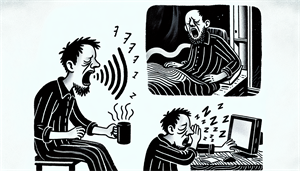Wondering why fat people snore? It’s often due to extra weight leading to narrowed airways and softer throat tissue, which vibrate and cause snoring.
This article unpacks the science behind this, exploring how neck and central body fat contribute to the issue and what you can do about it.
Key Takeaways
-
Obesity increases the risk of snoring and sleep apnea due to excess fat around the neck compressing the upper airway, central obesity impacting lung function, and fat accumulation in the tongue and around the airway.
-
Sleep apnea, a condition marked by repeated pauses in breathing during sleep, is prevalent among 40% of obese persons and can result in serious health risks like hypertension, stroke, and diabetes if untreated.
-
Effective interventions for breaking the cycle of snoring and obesity include weight loss programs, using anti-snoring devices and mouthpieces, adopting healthier sleep habits, and addressing other factors such as alcohol and nasal issues.
The Science Behind Obesity and Snoring

There’s a complex relationship between weight gain and snoring. Weight gain significantly contributes to snoring, as it’s a major risk factor. When a person experiences weight gain and snoring issues, it is often due to the compression of the upper airway resulting from the accumulation of excess fat around the neck. This fat constricts the airway, disrupting the normal flow of air and leading to the characteristic sounds of snoring.
Interestingly, the story doesn’t end with just a disturbed sleep cycle. Snoring, in turn, can lead to severe complications such as sleep apnea. In fact, around 40% of obese individuals experience sleep apnea. Quite a hefty number, isn’t it? While obesity is a significant trigger, other factors such as congested nasal passages from colds or allergies, and even the position in which you sleep, can contribute to snoring.
The Role of Neck Fat
Focusing on the impact of neck fat on snoring reveals some fascinating insights. The fat around the neck can compress the upper airway, creating a narrower channel for air to flow. This increased resistance can lead to turbulent airflow resulting in louder snoring sounds.
A neck size exceeding 16 inches is often a red flag, suggestive of an increased risk of snoring, which is often correlated with a higher body mass index.
Impact of Central Obesity
Central obesity, which refers to an excessive accumulation of fat around the midriff and chest area, also plays a pivotal role. This extra fat can indirectly compress the upper airway, restrict lung function, and contribute to obesity hypoventilation syndrome, a serious respiratory complication. Central obesity can lead to a decrease in lung volume and capacity, potentially worsening snoring and sleep apnea.
Moreover, fat accumulation in the tongue and around the pharyngeal airway can lead to impaired lung function, further exacerbating snoring and sleep apnea. Simply put, central obesity can cause a domino effect, compressing the upper airway, reducing lung capacity, and worsening snoring and sleep apnea.
Sleep Apnea: A Major Health Concern for Obese Individuals

Moving on, sleep apnea, a serious health concern and one of the sleep breathing disorders, has a strong correlation with obesity. Repeated pauses in breathing characterize this condition during sleep. Among obese individuals, the condition is quite prevalent, with 40% of them being patients experiencing sleep apnea. Addressing sleep apnea can help individuals achieve a good night’s sleep.
Interestingly, snoring is not just a noisy annoyance but can be a telling sign of sleep apnea. It is noteworthy that 95% of people with obstructive sleep apnea snore, and an intriguing 80% of individuals who snore are found to suffer from this sleep disorder. If left unaddressed, sleep apnea can result in serious health risks including hypertension, stroke, diabetes, Alzheimer’s disease, and depression.
Identifying Sleep Apnea Symptoms
Identifying symptoms of sleep apnea, such as loud snoring, gasping for air, and excessive daytime sleepiness, is key to pursuing appropriate treatment. However, these symptoms are just the tip of the iceberg. Sleep apnea can also manifest in less common symptoms like depression and anxiety, disruptions in brain function, impotence, uncontrolled high blood pressure, frequent night-time urination, teeth grinding, restless sleep, night sweats, irritability, and reduced sleep quality.
Seeking Professional Help
The severity of sleep apnea calls for professional intervention for effective treatment and management. This includes sleep studies and consultations with sleep apnea dentists or E.N.T specialists.
Sleep apnea is diagnosed through a sleep study, either in a medical office or at home. Following a diagnosis, a sleep apnea dentist can provide specialized treatments to assist with sleep apnea.
Breaking Free from the Snoring-Obesity Cycle

With an understanding of the intricate factors contributing to snoring and sleep apnea, it’s time to delve into strategies to break this cycle of snoring and obesity. The cycle contributes to:
-
disrupted sleep
-
reduced physical activity
-
increased consumption of carbohydrate-rich foods
-
weight gain
This increased weight further exacerbates snoring, leading to a continuous cycle of poor sleep, fatigue, and unhealthy lifestyle choices.
Personalized solutions for overweight individuals to reduce snoring include:
-
Weight loss programs
-
Side-sleeping
-
Nasal strip use
-
Mouthpiece wearing
-
Throat exercises
Refraining from eating too close to bedtime is also important to prevent indigestion, reflux, and discomfort that can disrupt a good night’s sleep.
Weight Loss Strategies
Effective strategies for achieving sustainable weight loss to reduce snoring include front-loading meals, adopting a low-carb diet, and eating smaller portions. These strategies can not only reduce snoring but also improve overall health.
Front-loading meals, or consuming more food in the morning and less in the evening, can potentially decrease snoring by lowering the chances of acid reflux during sleep and potentially enhancing digestion. Embracing a low-carb diet has the potential to enhance sleep quality and facilitate weight loss.
Consuming smaller portions aids in weight loss by decreasing calorie intake, which can subsequently help you lose weight and reduce excess fat deposits around the neck and throat.
Snoring Remedies Tailored for Overweight Individuals
Mouthpieces are designed to bring the jaw forward, preventing the tongue from falling back and obstructing the airway. They include anti-snoring mouthguards, nasal dilators, and sleep apnea mouthpieces.
Utilizing a wedge pillow to slightly elevate the head has proven to be effective in reducing snoring for overweight individuals who are unable to sleep on their side. Other alternatives include CPAP therapy and mouth exercises.
Establishing Healthy Sleep Habits
Cultivating healthy sleep habits, such as sticking to a consistent sleep schedule, practicing good sleep hygiene, and finding the right sleep position, is vital in enhancing sleep quality and minimizing snoring. This approach promotes better sleep quantity and quality, which is particularly important for obese individuals who are more susceptible to sleep disturbances and snoring.
The components of practicing good sleep hygiene involve:
-
Setting a strict sleep schedule
-
Following a bedtime routine
-
Forming healthy habits
-
Optimizing your bedroom environment to further support improved sleep quality and reduced snoring.
The Benefits of Weight Reduction on Snoring and Overall Health

The advantages of weight loss go beyond just reducing snoring. It has a profound effect on cardiovascular health, lowering the risk of heart disease, stroke, and high blood pressure. Weight loss also plays a significant role in reducing the severity of sleep apnea and snoring.
Studies, such as the Sleep AHEAD study, have demonstrated the potential for weight loss to alleviate symptoms of sleep apnea and decrease snoring. Weight reduction also offers additional health benefits such as:
-
improved sleep quality
-
increased energy levels
-
better mood
-
enhanced cognitive function
Reduced Risk of Cardiovascular Disease
Obesity is closely linked to an elevated risk of cardiovascular disease and is considered the most significant risk factor. It plays a role in the emergence of risk factors like dyslipidemia, type 2 diabetes, hypertension, and sleep disorders, all of which can contribute to elevated blood pressure and heart attacks. Obesity and sleep apnea are associated with a 140% increased risk of heart failure, a 60% increased risk of stroke, and a 30% increased risk of coronary artery disease.
Weight loss plays a significant role in reducing the risk of heart troubles, stroke, and high blood pressure associated with obesity and sleep apnea. It is widely agreed that weight reduction is recommended to lower blood pressure in overweight and obese hypertensive patients.
Improved Sleep Quality
Enhanced sleep quality following weight loss has a significant impact on cognitive function as it promotes neuroplasticity in the brain. Restful and sufficient sleep enables the brain to consolidate memories, process information, and enhance cognitive performance. Furthermore, improved sleep quality can also lower the risk of age-related cognitive decline.
Adequate sleep quantity and quality have been linked to successful weight loss, while sleep deprivation may lead to metabolic issues and weight gain.
Addressing Other Snoring Factors

In addition to obesity, other elements such as alcohol consumption, nasal problems, and age-related changes also contribute to snoring. Alcohol, acting as a bronchodilator, leads to reduced muscle tone in the mouth and throat, causing throat muscles to relax. Nasal issues that can contribute to snoring include polyps, deviated septums, and nighttime allergies.
Age-related alterations that lead to snoring encompass a reduction in muscle tone in the muscles surrounding the airway and the constriction of the airway.
Alcohol and Snoring
Alcohol, acting as a bronchodilator, leads to reduced muscle tone in the mouth and throat, causing throat muscles to relax. This relaxation can cause the collapse of jaw muscles onto the airway, thereby increasing the probability of snoring. Consuming alcohol before bedtime raises the likelihood of snoring due to its muscle-relaxing effects on the throat, including the soft palate and tongue, which can result in vibrations and potential airway collapse.
Alcohol consumption can cause dehydration, leading to the drying out of airway tissues, resulting in louder snoring due to increased friction and vibration during breathing. Although alcohol consumption does not directly cause sleep apnea, it can aggravate the condition.
Nasal Issues and Snoring
Common nasal conditions that can cause snoring include:
-
Insufficient air humidity
-
Chronic allergies
-
Sinusitis
-
Common colds
-
Sinus obstructions
-
Deviated septum
-
Nasal polyps
Nasal polyps can obstruct the sinus passages, causing breathing difficulties and nasal blockage, which can result in snoring. Additionally, larger nasal polyps may elevate the risk of developing obstructive sleep apnea, worsening snoring.
A deviated septum can induce snoring by causing nasal congestion and limiting airflow, leading to audible breathing and snoring while asleep. Available treatments for nasal polyps include medication such as nasal sprays or oral steroids, and in some cases, surgical removal of the polyps. Corrective surgery is often necessary for a deviated septum.
Age-Related Snoring
Age-related factors contributing to snoring include sagging throat muscles which can block airflow and raise the propensity for snoring. This loss of muscle tone, along with the constriction of airways, are effects of aging on the respiratory system that contribute to snoring.
Estrogen plays a role in maintaining the muscle tone of throat muscles, which helps keep the airway clear. As estrogen levels decrease, typically with age, women may experience an increase in snoring due to less firm throat tissues.
It is advisable to consider lifestyle adjustments and seek medical evaluations to treat snoring associated with aging.
Summary
To sum up, obesity and snoring are interconnected in a complex manner, with obesity leading to snoring and sleep apnea, and snoring, in turn, exacerbating obesity by disrupting sleep and promoting unhealthy lifestyle choices. Breaking free from this vicious cycle requires a combination of weight loss strategies, snoring remedies tailored for overweight individuals, and establishing healthy sleep habits.
While losing weight can significantly alleviate snoring, it also provides numerous health benefits, including reduced risk of cardiovascular disease and improved sleep quality. Addressing other snoring factors such as alcohol consumption, nasal issues, and age-related changes can further help in managing snoring and improving sleep quality.
In conclusion, managing snoring and obesity is a multidimensional challenge that requires a holistic approach, combining lifestyle changes, medical interventions, and a commitment to overall health.
Frequently Asked Questions
How do you stop a fat person from snoring?
To stop snoring, it's important to focus on reducing body weight, as it is one of the most important treatments to try for snoring. This recommendation applies to people who are overweight or obese.
Does losing weight stop snoring?
Losing weight may reduce snoring for most people, but it may not eliminate it entirely for everyone. Weight loss, sleeping on one's side, and using nasal decongestants can significantly reduce snoring frequency, with weight loss having a major impact.
Why do skinny guys snore?
Thin people can snore due to a blocked nose, which creates the need for greater suction pressures to draw air into the lungs when breathing, narrowing the airway. Some men also have a structural problem, like a small jaw, causing snoring, regardless of their weight.
How are obesity and snoring related?
Obesity and snoring are related because excess neck fat and central obesity can compress the upper airway, disrupting normal airflow and leading to snoring. Weight gain around the neck and upper body significantly increases the likelihood of snoring.
What are some effective strategies for weight loss to reduce snoring?
To reduce snoring, focus on front-loading meals, adopting a low-carb diet, and eating smaller portions for sustained weight loss. These strategies not only help reduce snoring but also contribute to overall health.


